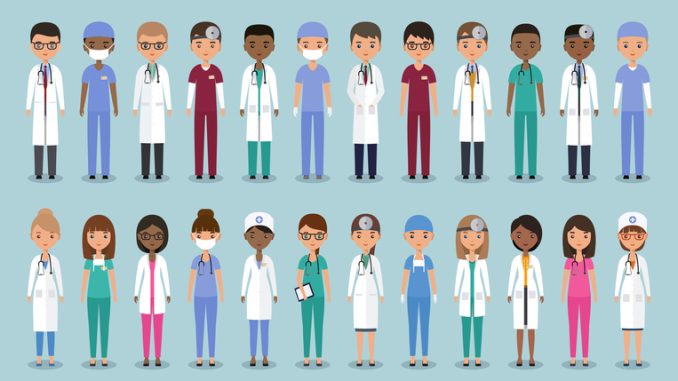
As reported by The Telegraph, as family doctor involvement in appointments drops to 43.9%, critics argue that increased reliance on paramedics and physician associates, funded by the additional roles reimbursement scheme (arrs), may compromise patient satisfaction and GP well-being
Health officials are keen to encourage the public to make more use of health professionals other than GPs to lift pressures on general practice.
Under a centrally funded scheme, practices can deploy workers such as paramedics, assistants and pharmacists without having to pay their wages.
However, there is little evidence to support the safety or effectiveness of the system.
Official NHS data show 43.9 per cent of appointments at GP practices were carried out by family doctors in September – a fall from 49.7 per cent in two years.
Separate figures show that the number of paramedics working in GP practices almost doubled from 650 in March 2020 to 1,213.
Meanwhile the number of physician associates deployed in surgeries has soared in the same period from 152 to 1,743.
A study of more than 6,000 GP practices by the University of Manchester suggests that surgeries that rely most heavily on such staff had lower levels of patient and GP satisfaction – and end up with more patients being sent to A&E.
Patients’ groups said that too many people were being left with a “cut-price” service when they wanted to see a family doctor.
Meanwhile, locum doctors said that they are increasingly struggling to get work as GPs, despite claims of widespread shortages, because practices preferred to plug the gaps with health workers for whom they do not have to pay.
A new campaign called the NHS General Practice Team that was launched by health officials last week makes no mention of GPs at all.
The drive, which promotes the increasingly varied roles within general practice, shows patients seeing mental health practitioners and paramedics instead of a GP.
There is no mention of doctors or GPs in any of the campaign material, with adverts promoting 14 different roles at the GP surgery of which none is a doctor or have medical training.
One GP said: “There is something and some people missing from this campaign.”
The role of physician associate – which requires two years of postgraduate training but no formal medical training, and is currently unregulated – is currently being extended across the NHS, despite concerns from many doctors.
Physician associates are supposed to share some of the duties performed by doctors, including taking medical histories, examining patients, making diagnoses and analysing test results. However, they are supposed to work under the supervision of a doctor at all times.
The number of paramedics drafted to work in GP practices has doubled since 2020, with more than 1,700 now deployed.
It comes as ambulance services are under record pressure, with regulators last week warning that 60 per cent are failing on safety.
The drain of paramedics out of the sector is also at a time when vacancies for all jobs across NHS ambulance services are the highest on record, with more than 4,000 roles empty.
Physician associates also cannot prescribe, meaning that GPs need to step in if medication is required.
NHS England said that it has now hired an extra 31,000 front-line staff other than GPs to work in practices since 2019, against a target to recruit around 26,000 such workers.
The central scheme – called the Additional Roles Reimbursement Scheme (ARRS) – means GP practices do not have to pay the wages of such workers, which are paid by NHS England.
It brings the total in such roles in England to 42,000 – dwarfing the number of family doctors, which stands at about 27,000.
In 2019, the Government promised to increase GP numbers by 6,000 by 2024.
Since then numbers of full-time equivalents have fallen by about 900.
GPs available for temporary work in general practice said that their work was now drying up, despite thousands of vacancies for family doctors, because surgeries preferred to deploy ARRS workers that cost them nothing.
A GP in Yorkshire told the Telegraph: “It’s a pot of money from NHS England that GP partners are being told you can use to hire any healthcare staff that are not GPs.
“There are hundreds if not thousands of GPs out there who are effectively unemployed. A practice I worked at for nine, 10 years says they don’t need me anymore, they’ve hired a physician associate and two pharmacists.
“We keep hearing that there is a shortage of GPs, but it’s just not true. There are no vacancies. There is just one in my area, and I’m not alone, there are hundreds of my colleagues just sat at home twiddling their thumbs.
“The other thing they say is: ‘Oh, we have a shortage of community pharmacists, and we have a shortage of paramedics.’ Well, this is the reason as well, they should work in their own field.
“Traditionally home visits would have been done by a senior GP. They’re being done by paramedics, doing them on their own, or pharmacists. A lot of GP partners turn around and say: ‘Oh, but they’re very good.’ They may be good, but they’re not doctors. They don’t have medical degrees.”
A study by the University of Manchester examining 6,287 practices last year found that new roles in general practice such as paramedics and physician associates were linked to lower patient and GP satisfaction – and increased the amount of time GPs spent delegating tasks and supervising.


Be the first to comment